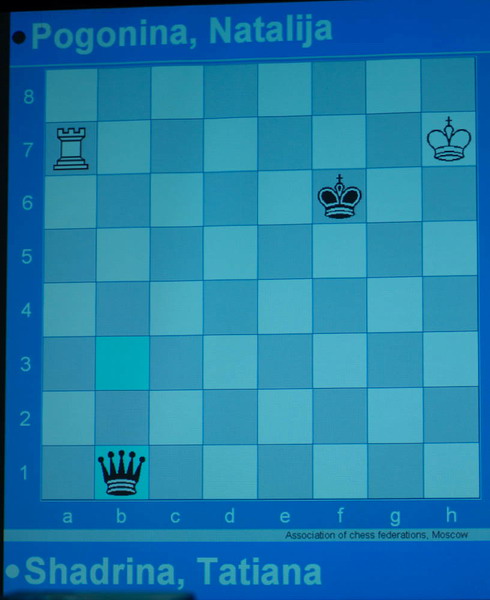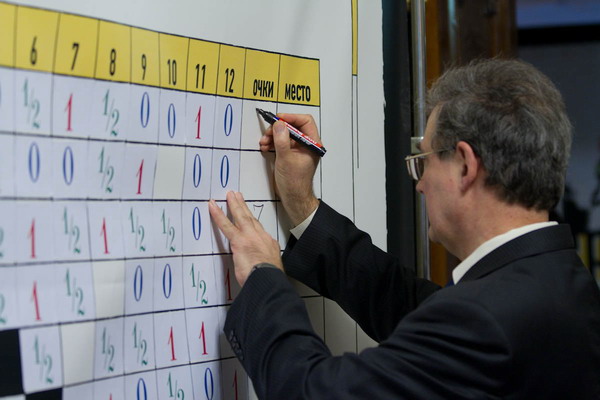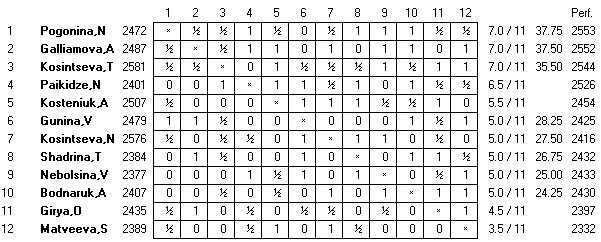Russian Superfinal: Impressions |
| Written by Administrator | ||||
| Wednesday, 08 December 2010 | ||||
 by Natalia Pogonina for her Chess.com Tuesday column Every year the best Russian chess players get to compete at the Russian Superfinal. A round robin featuring 12 world-class grandmasters is always an exciting event. To qualify for it, you either have to be in the Russian top-3 by rating, get a medal in the previous Superfinal, earn your place by performing well in the Top League (a very strong open tournament), or get a wild card from the organizers. At some point I have won the Top League, but now usually get invited by rating. Normally the womens and mens Superfinals are held at the same time in December. However, this time, due to the Womens World Championship, the organizers adjusted. 2010 has set a record in terms of the events class: all the Olympic gold winners took part, a few members of the 2nd team, and a few other strong players. Womens World Champion Alexandra Kosteniuk has skipped this tournament a few times, but this year she confirmed her participation to find herself at #3 in the rating seedings at the national championship (yes, thats how prestigious and strong the Superfinal is). For those interested in the financial side, the womens Superfinal is strongly inferior to the mens. All the 12 participants were to receive a prize: about $13,000 for 1st, $10,000 for 2nd, $6,600 for 3rd; last place - $650). A new rule had been introduced this year: participants couldnt offer a draw without consulting the arbiter. Womens chess is generally more fighting, so its not clear what the organizers were trying to achieve. Some players didnt feel it was their cup of tea, and this rule might have affected some of the results. I was seeded 6th and had a goal of finishing in the top-5. More importantly, it was essential to prove to myself that I am out of my chess crisis, and can play confidently and well. Lets take a brief look at how things went. Being busy at the WWCh, I didnt have time for a thorough analysis of the games, so I will share my impressions. In the 1st round I had to face World U-20 vice-champion WGM Olga Girya (2435). At some point I had a significant advantage, but couldnt convert it, so the game ended in a draw. In the second round two-times world vice-champion IM Alisa Galliamova (2487) made a mistake in the opening, and I got a chance to obtain a better position even being a pawn down. I didnt make use of that opportunity, and got a worse position. Stubborn defense saved me the half-point. Round 3, vs. IM Anastasia Bodnaruk (2407), my passive play resulted in a slightly inferior endgame. Fortunately, Nastya decided to go all-in and sacrificed the exchange to spice things up and couldnt handle the arising complications in time trouble (the game ended in a nice mate). In the 4th round I played vs. the young Georgian chess prodigy WGM Nazi Paikidze (2401), the current leader by that point, who had won quite a few junior World and European Championships. My position was slightly worse from the opening, but then I got a chance to equalize and take advantage of her time trouble by winning a drawish knight endgame. Round 5 against ex-World U-20 Champion WGM Vera Nebolsina (2377). I played rather carelessly in the opening, and Black could have obtained some advantage. She missed that chance, and my position started improving. In her time trouble Vera sacrificed an exchange, and I was too afraid to accept it. This could cost me half a point, but somehow I managed to outplay my opponent in time trouble. In round 6 I lost to an ex-junior world champion WGM Valentina Gunina (2479), who started the tournament with 0 out of 3. This was due to psychological reasons and a wrong opening choice.
Playing against the Kosintseva sisters has never been a piece of cake for me In round 7 I played a great game with two-time European Champion GM Tatiana Kosintseva (2581). I sacrificed a piece for initiative, and we both had our chances at various stages of the game. The chess fight ended in a draw agreement
in a position where I could obtain an endgame with good winning chances! Round 8, against ex-world vice-champion Svetlana Matveeva (2389). After contemplating my options, I talked myself into the a draw with Black is ok paradigm and went for a solid variation where White can give a perpetual (which she did). Round 9 I faced IM Nadezhda Kosintseva (2576), who had a good start, but a terrible finish. In the endgame I had good winning chances, but, as it often happens with the sisters when playing against me, she escaped.
Games against world champions are always special Round 10 vs Womens World Champion GM Alexandra Kosteniuk (2507). Somehow I played too shyly in the opening, and after an obvious exchange sacrifice my opponent found herself in command of the situation. Later on she decided to sacrifice a piece instead of capitalizing on her positional advantages, thus allowing me to draw the game. Before the last round I had 6 out of 10 and was ranked 4th (Galliamova, Paikidze and Kosintseva T. were at 6.5). Galliamova and Kosintseva made a quick draw. Paikidze, probably feeling the pressure of becoming the champion in the case of a win, self-destructed quickly with White. Therefore, I had to win with Black against IM Tatiana Shadrina (2384) to catch up. My opponent wasnt prepared well enough against the sharp line I chose. I got three pawns for a piece and a strong initiative. However, my technique was not perfect, so Tanya got some chances in time trouble. The rook endgame we arrived at turned out to be study-like: I was proud to convert it into a queen vs. rook + pawn endgame. It took me a lot of time and patience to win that one, but that was an important victory.
White either loses the rook, or gets mated, 0-1 So, after the tie-break scores were calculated, it turned out that I was 1st, Alisa Galliamova 2nd, Tatiana Kosintseva 3rd.
Final Standings (Russian Superfinal)
According to the Regulations, Alisa and I were to play a two-game rapid chess (15m+10s) match right after the game. This is a strange ruling since, as many people point out, it is better to either have the champion determined by the tie-break scores, or have all three compete for the title. Also, while my opponent made a quick draw, I was barely alive after the nearly 6-hour marathon. The 1-hour break between the main part and the tie-break match didnt help much in terms of recovering my energy, although I did my best to eat some snacks and go outside to breathe some fresh air.
Some of the eminent kibitzers during the tie-break match: Evgeny Bareev (official commentator), Alexandra Kosteniuk (unofficial commentator), Head of the Russian Chess Federation Ilya Levitov (looking at the camera) In the first game I managed to escape with Black, but lost the second game in a rather stupid fashion with White. Nonetheless, this doesnt diminish Alisas achievement, who became the Russian Champion for the 2nd time in a row. I got silver, Tatiana bronze.
With Vera Nebolsina (right) and Nickolai, who has been assisting me throughout the event, but arrived too late for the tie-break match Generally speaking, the tournament proved to be very exciting and interesting in the chess sense. Lots of beautiful games, great fighting spirit of the participants, many spectators. This event has certainly become a holiday for chess fans all over the world. Thanks to those of you who have been sending me messages of support throughout the Superfinal!
Most of the participants + chess officials and Alexandra's daughter (who asked "Mum, why didn't you get anything?" - "Next time") And now its time to check how rusty your tactics are. In some cases you will be asked to find a continuation that occurred in the game, while in others to improve on the play of the participants: Photos by Anna Burtasova, Eugene Surov, Maria Bolshakova
Write Comment |
||||
| Last Updated ( Wednesday, 08 December 2010 ) | ||||
| < Prev | Next > |
|---|






















